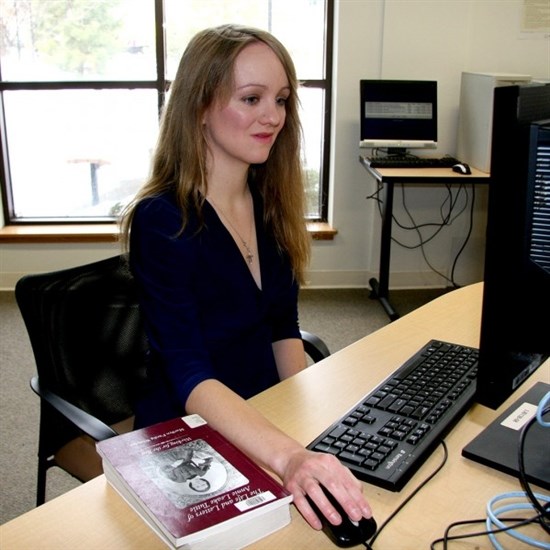
Undergraduate researcher Ariel Little enriched her history major with a UREAP research project.
Image Credit: Contributed
February 08, 2016 - 3:06 PM
In the late nineteenth and early twentieth century, when anti-Chinese sentiments were prevalent among the general population in British Columbia, Christian missions were one of the few places where immigrant Chinese and Canadian cultures mixed. History major Ariel Little wondered, what impact did these missions have on the development of Chinese Canadian culture?
Little applied to TRU’s Undergraduate Research Experience Award Program (UREAP) for a grant to explore the idea in a semester-long, independent research project. By looking into the impact of Christian missions on Chinese immigrants in BC, she hoped to investigate the development of cultural hybridity—the occurrence of a group or an individual’s customs consisting of components from different cultures.
“Over the course of my research I discovered that the missions primarily fostered hybridity by allowing the two cultures to intermingle,” she said. “For example, allowing Chinese residents of the missions to dress in the styles of both cultures, and celebrating both Christian and Chinese holidays, such as Chinese New Year.”
Her project, titled “Fostering Hybridity: The Development of Chinese Canadian Cultural Identity in British Columbia’s Christian Missions, 1880-1950,” combined Little’s interest in both the history of Christianity and the history of Canada. She said the chance to draw attention to an important area of Canadian history that has traditionally received little scholarly attention appealed to her.
“I was interested by how immigration was often what led to the development of hybridity,” she said. “As Canada is a nation … where people often define themselves as ethnic hybrids (e.g. Chinese Canadian, Indo-Canadian, etc.), I felt looking into how cultural hybridity develops would help me better understand Canadian culture.”
The UREAP grant enabled her to experience the entire historical process from project conception to conducting research in archives—including travel to the BC Archives in Victoria—for the first time, gathering and analyzing historical documents about the missions.
“In my experience, historical research leads to a deeper understanding of both human nature and the present, and you are sure to discover some captivating stories along the way,” she said. “I hope my research has revealed that missionary activities were far from monolithic and exclusively negative endeavours, but in reality were complex and highly varied.”
Little concluded her research by writing her first full-length article for publication, supervised by History faculty member Tina Block. Since graduating with a Bachelor of Arts last June, she has presented her findings at TRU’s annual Philosophy, History and Politics Conference and has submitted her paper to TRU’s Undergraduate Research Journal.
She found research experience was an excellent way to delve deeper into her field and explore areas that interested her.
“It is also very personally rewarding to complete a substantial research project of your own design, as it is something that is purely self-motivated, unlike a mandatory assignment, and it stems from your own creativity and effort.”
Little said her topic’s significance to Canadian religious history and Chinese Canadian history also showed her how many un-investigated areas and aspects of history remain to be explored, and has fuelled her desire to engage in further research—she’ll begin graduate study in the fall.
News from © iNFOnews, 2016